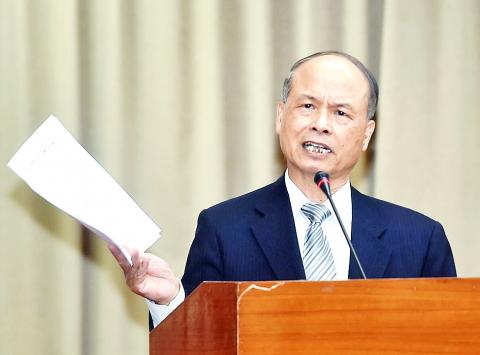Minister of Finance Chang Sheng-ford (張盛和) said yesterday that Taiwan would no longer apply to participate in the China-initiated Asian Infrastructure Investment Bank (AIIB) because the nation is not being treated with dignity and equality.
“The matter will be left for the new administration to decide,” Chang said in a telephone interview with reporters, referring to the administration of president-elect Tsai Ing-wen (蔡英文), which is to take office on May 20.
Chang said the ministry sent a letter to the Interim Secretariat for Establishing the AIIB in March last year expressing Taiwan’s wish to become a founding member of the bank, but the bid was rejected.

Photo: Fang Pin-chao, Taipei Times
Chinese President Xi Jinping (習近平) later said several times that China welcomed Taiwan’s participation in the AIIB under an appropriate name, but he never specified what Beijing considered “appropriate.”
After the AIIB was formally inaugurated in January, Chang sent a congratulatory message to AIIB president Jin Liqun (金立群) and asked whether Taiwan needed to apply again, but he received no response.
Since Tsai was elected on Jan. 16, Jin has repeatedly described Taiwan’s AIIB bid as a “family matter” and has insisted that Taiwan is not a sovereign state, so should follow the Hong Kong model and ask the Chinese Ministry of Finance to apply for Taiwan’s membership on its behalf in accordance with the AIIB charter.
“We cannot accept such a model,” Chang said, adding that the ministry would no longer apply for membership because Taiwan cannot join the AIIB under conditions of dignity and equality.
However, this does not mean the “end of the AIIB bid,” which hinges on the attitude of China going forward, he said.
Asked if Jin’s attitude was related to the Democratic Progressive Party winning power in Taiwan, Chang did not comment, but he stressed that Taiwan would not accept participation in the AIIB based on the Hong Kong model.
A Ministry of Finance official yesterday said that Taiwan’s bottom line is to join the AIIB under the name “Chinese Taipei” — under the terms of a bipartisan agreement reached last year — and Jin’s demand that the nation musty apply through the Chinese Ministry of Finance had hurt Taiwan’s dignity.
However, the official also said that if China was willing to let Taiwan apply to join in its capacity as an Asian Development Bank member, then it would be able to discuss the possibility of joining the bank.
“The designation is important. We cannot be denigrated,” the official said.
Chung-Hua Institution for Economic Research (CIER, 中華經濟研究) president Wu Chung-shu (吳中書) said AIIB membership is intended to expand investment channels for local firms, but must not be used to downgrade the nation’s sovereignty.
There is still room for cooperation if the two sides can work out differences over AIIB accession requirements, Wu said.
Richard Watanabe (吳偉臺), financial service leader at PricewaterhoueCoopers Taiwan, said AIIB membership has little bearing on Taiwan, as local firms are not ready for international construction projects.
Additional reporting by Crystal Hsu

DAREDEVIL: Honnold said it had always been a dream of his to climb Taipei 101, while a Netflix producer said the skyscraper was ‘a real icon of this country’ US climber Alex Honnold yesterday took on Taiwan’s tallest building, becoming the first person to scale Taipei 101 without a rope, harness or safety net. Hundreds of spectators gathered at the base of the 101-story skyscraper to watch Honnold, 40, embark on his daredevil feat, which was also broadcast live on Netflix. Dressed in a red T-shirt and yellow custom-made climbing shoes, Honnold swiftly moved up the southeast face of the glass and steel building. At one point, he stepped onto a platform midway up to wave down at fans and onlookers who were taking photos. People watching from inside

A Vietnamese migrant worker yesterday won NT$12 million (US$379,627) on a Lunar New Year scratch card in Kaohsiung as part of Taiwan Lottery Co’s (台灣彩券) “NT$12 Million Grand Fortune” (1200萬大吉利) game. The man was the first top-prize winner of the new game launched on Jan. 6 to mark the Lunar New Year. Three Vietnamese migrant workers visited a Taiwan Lottery shop on Xinyue Street in Kaohsiung’s Gangshan District (崗山), a store representative said. The player bought multiple tickets and, after winning nothing, held the final lottery ticket in one hand and rubbed the store’s statue of the Maitreya Buddha’s belly with the other,

‘NATO-PLUS’: ‘Our strategic partners in the Indo-Pacific are facing increasing aggression by the Chinese Communist Party,’ US Representative Rob Wittman said The US House of Representatives on Monday released its version of the Consolidated Appropriations Act, which includes US$1.15 billion to support security cooperation with Taiwan. The omnibus act, covering US$1.2 trillion of spending, allocates US$1 billion for the Taiwan Security Cooperation Initiative, as well as US$150 million for the replacement of defense articles and reimbursement of defense services provided to Taiwan. The fund allocations were based on the US National Defense Authorization Act for fiscal 2026 that was passed by the US Congress last month and authorized up to US$1 billion to the US Defense Security Cooperation Agency in support of the

‘COMMITTED TO DETERRENCE’: Washington would stand by its allies, but it can only help as much as countries help themselves, Raymond Greene said The US is committed to deterrence in the first island chain, but it should not bear the burden alone, as “freedom is not free,” American Institute in Taiwan Director Raymond Greene said in a speech at the Institute for National Defense and Security Research’s “Strengthening Resilience: Defense as the Engine of Development” seminar in Taipei yesterday. In the speech, titled “Investing Together and a Secure and Prosperous Future,” Greene highlighted the contributions of US President Donald Trump’s administration to Taiwan’s defense efforts, including the establishment of supply chains for drones and autonomous systems, offers of security assistance and the expansion of